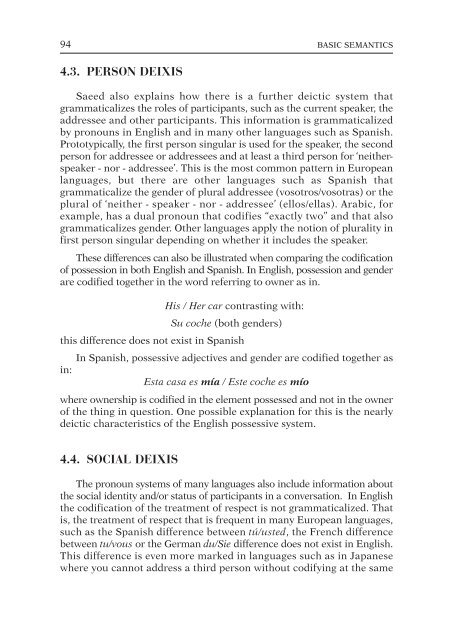Semantics
Create successful ePaper yourself
Turn your PDF publications into a flip-book with our unique Google optimized e-Paper software.
94 BASIC SEMANTICS<br />
4.3. PERSON DEIXIS<br />
Saeed also explains how there is a further deictic system that<br />
grammaticalizes the roles of participants, such as the current speaker, the<br />
addressee and other participants. This information is grammaticalized<br />
by pronouns in English and in many other languages such as Spanish.<br />
Prototypically, the first person singular is used for the speaker, the second<br />
person for addressee or addressees and at least a third person for ‘neitherspeaker<br />
- nor - addressee’. This is the most common pattern in European<br />
languages, but there are other languages such as Spanish that<br />
grammaticalize the gender of plural addressee (vosotros/vosotras) or the<br />
plural of ‘neither - speaker - nor - addressee’ (ellos/ellas). Arabic, for<br />
example, has a dual pronoun that codifies “exactly two” and that also<br />
grammaticalizes gender. Other languages apply the notion of plurality in<br />
first person singular depending on whether it includes the speaker.<br />
These differences can also be illustrated when comparing the codification<br />
of possession in both English and Spanish. In English, possession and gender<br />
are codified together in the word referring to owner as in.<br />
His / Her car contrasting with:<br />
Su coche (both genders)<br />
this difference does not exist in Spanish<br />
In Spanish, possessive adjectives and gender are codified together as<br />
in:<br />
Esta casa es mía / Este coche es mío<br />
where ownership is codified in the element possessed and not in the owner<br />
of the thing in question. One possible explanation for this is the nearly<br />
deictic characteristics of the English possessive system.<br />
4.4. SOCIAL DEIXIS<br />
The pronoun systems of many languages also include information about<br />
the social identity and/or status of participants in a conversation. In English<br />
the codification of the treatment of respect is not grammaticalized. That<br />
is, the treatment of respect that is frequent in many European languages,<br />
such as the Spanish difference between tú/usted, the French difference<br />
between tu/vous or the German du/Sie difference does not exist in English.<br />
This difference is even more marked in languages such as in Japanese<br />
where you cannot address a third person without codifying at the same



